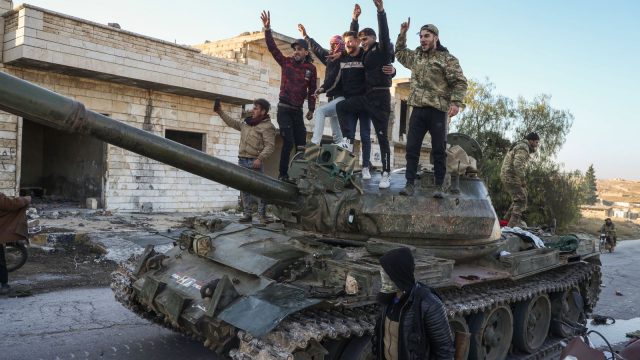Syria’s president has said his country will “defend its stability and territorial integrity” after rebels reportedly took control of most of the country’s second-largest city Aleppo.
In his first public comments since the start of the offensive, Bashar al Assad said the regime would defeat the “terrorists and their supporters”.
In comments released by the state news agency SANA, he added that Syria is able to defeat them no matter how much their attacks intensify.
On Saturday thousands of insurgents took over most of Aleppo, controlling its airport before expanding their shock offensive to a nearby province.
They faced little to no resistance from government troops, according to fighters and activists.
Thousands of fighters also seized towns and villages in northern Hama, a province where they had a presence before being expelled by government troops in 2016.
The swift and surprise offensive is a huge embarrassment for Mr Assad, and raises questions about his armed forces’ preparedness.
The insurgents, led by the Salafi jihadi group, Hayat Tahrir al Sham, and including Turkey-backed fighters, launched their shock offensive on Wednesday.
They first staged a two-pronged attack in Aleppo and the Idlib countryside, entering Aleppo two days later.
By Saturday evening, they had seized at least four towns in the central Hama province and claimed to have entered the provincial capital.
At least 327 people, including 44 civilians, have been killed since the operation started on Wednesday, the UK-based Syrian Observatory for Human Rights (SOHR) said.
Thousands of people have also reportedly been displaced following the escalation in violence.
The insurgents staged an attempt to reclaim areas they controlled in Hama in 2017 but failed.
Syria’s armed forces said in a statement on Saturday that to absorb the large attack on Aleppo and save lives, it redeployed troops and equipment and was preparing a counter-attack.
The statement acknowledged that insurgents entered large parts of the city but said they have not established bases or checkpoints.
Russia’s Defence Ministry said its air force had carried out strikes on Syrian rebels in support of the country’s army, Russian news agencies reported.
The state-run Russian Centre for the Reconciliation of the Enemy Parties in Syria said the missile and bomb strikes had targeted “militant concentrations, command posts, depots, and artillery positions” in Aleppo and Idlib provinces. It claimed about 300 rebel fighters had been killed.
The strikes followed what was the boldest rebel assault for years in a civil war where front lines had largely been frozen since 2020.
Russia has been a key ally for Mr Assad during the Syrian civil war, helping him regain control over the country following an uprising that began in 2011.
The long-simmering war, which has killed hundreds of thousands of people and displaced many millions, has ground on since, with no formal end in sight.
Read more:
Rebels ‘take control’ of airport and seize most of Syria’s second city
A setback for the regime, or the start of a major escalation?
A statement from the White House said the US was “closely monitoring the situation”.
“The Assad regime’s ongoing refusal to engage in the political process outlined in UNSCR 2254, and its reliance on Russia and Iran, created the conditions now unfolding, including the collapse of Assad regime lines in northwest Syria.
“At the same time, the United States has nothing to do with this offensive.
“The United States, together with its partners and allies, urge de-escalation, protection of civilians and minority groups, and a serious and credible political process that can end this civil war once and for all with a political settlement consistent with UNSCR 2254.”
The United Nations Security Council Resolution 2254 was unanimously adopted in December 2015 – calling for a ceasefire and political settlement in Syria. However, no real progress has been made to implement the resolution.



















